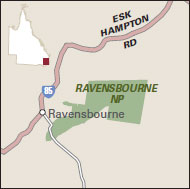
PARK INFORMATION
NPRSR 13 7468
SIZE
687 ha
VISITOR INFORMATION
Hampton (07) 4697 9066 | www.toowoombaholidays.info
LOCATION AND ACCESS
132 km north-west of Brisbane; 33 km west of Esk via Esk–Hampton Rd; 49 km north–east of Toowoomba via New England Hwy and Esk–Hampton Rd
CAMPING
No camping

Set on a spur of the Great Dividing Range, Ravensbourne National Park protects one of the few remaining pockets of rainforest that originally covered much of this area. Here the cool, moist conditions beneath the rainforest canopy support palm groves, vines and an abundance of ferns, including staghorn ferns. This contrasts dramatically with the open eucalypt forest found on the park's eastern side, where blackbutt, Queensland blue gum, she-oak and wattle species predominate.
More than 80 bird species have been recorded. The rainforest is home to satin bowerbirds, red-backed fairy-wrens, green catbirds and paradise riflebirds. There are circular hollows on the rainforest floor, made by the threatened black-breasted button-quail as it spins around as it feeds. In the eucalypt forest, you may see red-tailed and glossy black-cockatoos.
Until the late 1800s, Aboriginal people regularly passed through this region on their way to the Bunya Mountains for the bunya nut feasts, and yam diggings can still be seen near the park's western border. Nowadays, travellers come here to picnic, bushwalk and watch the wildlife. To get your bearings, stop at Gus Beutel Lookout for panoramic views of the range towards Toowoomba. A short self-guiding walk (500-metre circuit, 15 minutes, easy) starts in Cedar Block picnic area; from Blackbean picnic area, walks include Rainforest Circuit (1.7 km return, 40 minutes, easy), Palm Circuit (3.6 km return, 1.5 hours, easy) and Buaraba Creek Track (6.2 km return, 2 hours, medium difficulty).Camping is not allowed here, but there is a campsite at nearby Crows Nest National Park and plenty of other accommodation in the area.